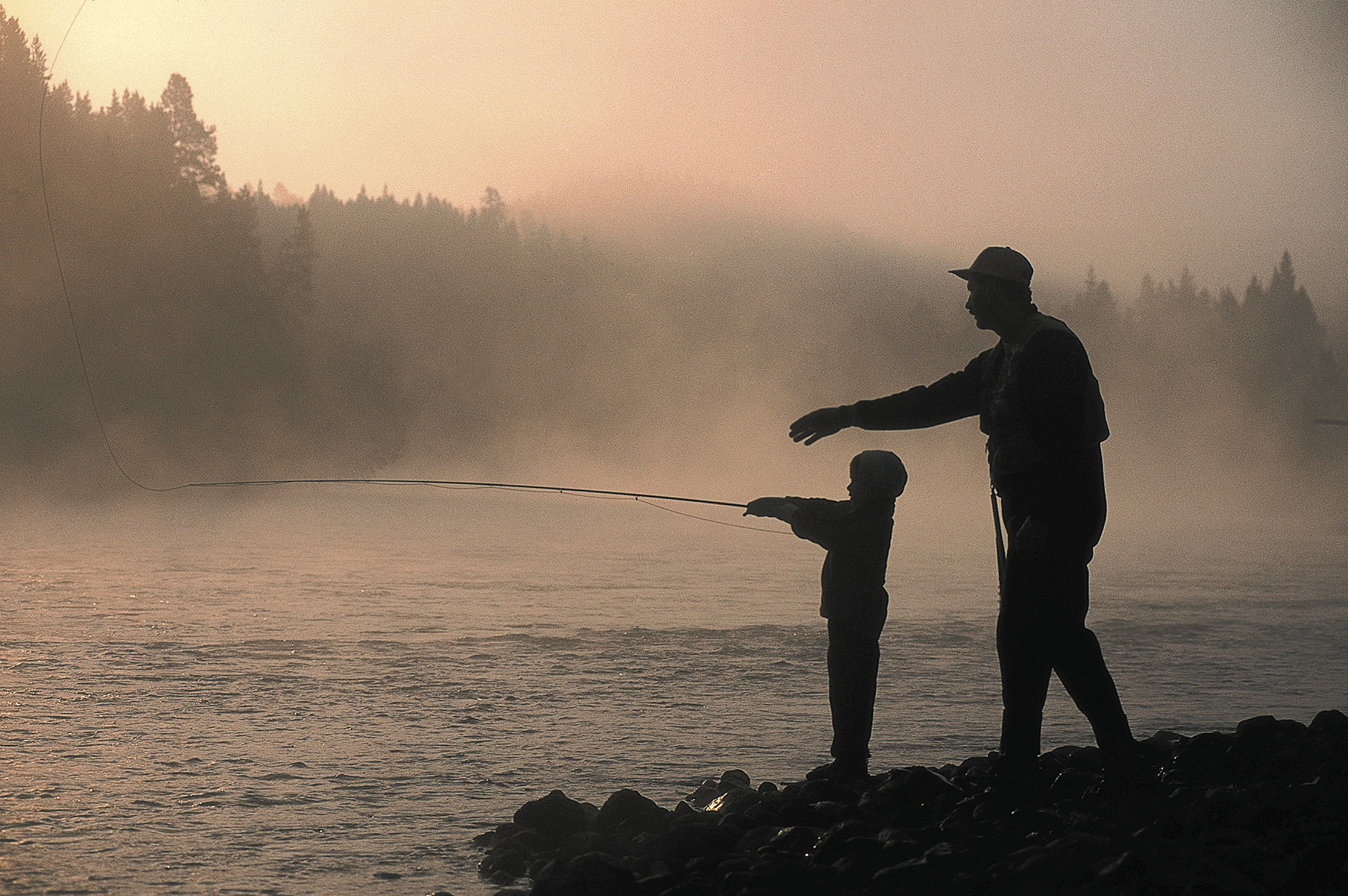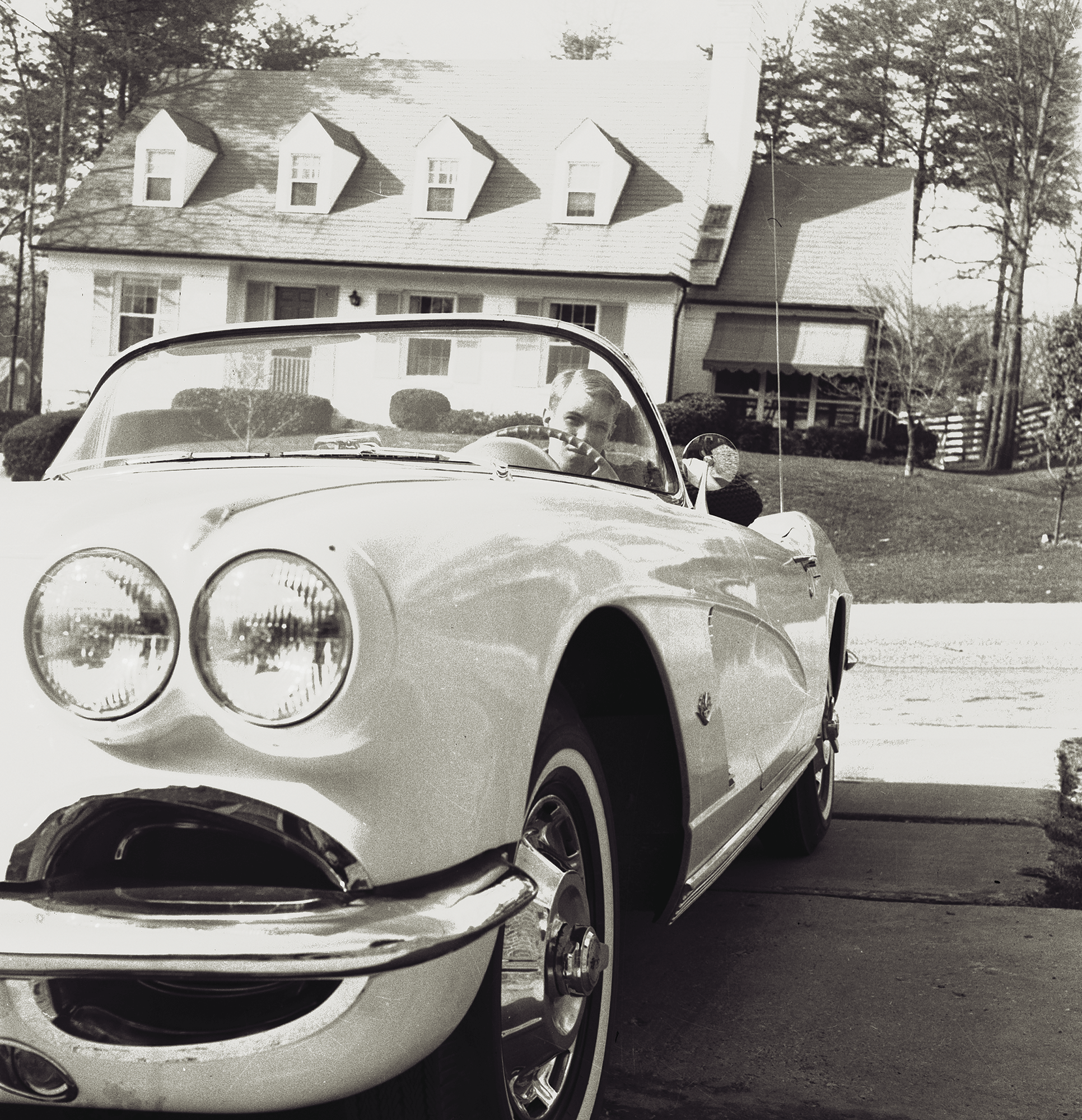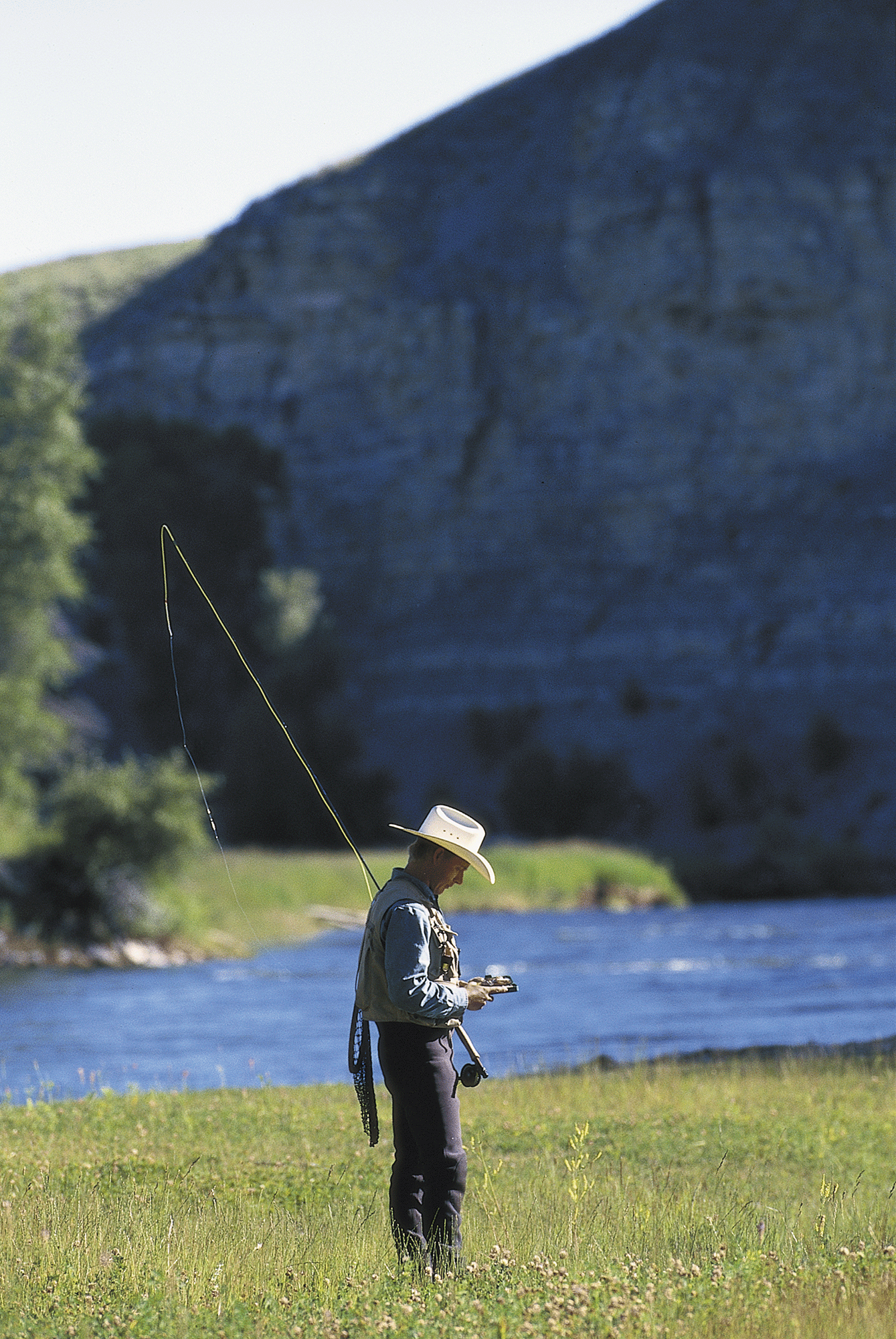
17 Oct South Fork
PERHAPS I'D DREAMED OF THOSE WALKS we’d take, from our cottage near the Chesapeake Bay to a tidal creek by the Patuxent River. My father would arrive for the weekend and I’d invariably beg, “Can we go to the creek?” Most Fridays he’d resist, but on a few we’d hike the quarter mile, my left hand in his, the other carrying a net, to a narrow inlet where blue crabs hid in the eelgrass, and where for a half-hour before that night’s chaos, the drinking and partying, he’d be mine. I was 5, spending May through October with my mother, seeing my father two days a week, he often drunk, and aware that if I could get him alone for those few minutes, without the revelers who shared our cottage, I’d be euphoric.
JUST THEN HE SPOKE FROM THE BUNKHOUSE HALL: “It’s 4:30. Let’s try that evening hatch.” I awoke, befuddled. Had I been dreaming? In any event, I recalled our walks and found myself wondering if my father comprehended the phrase “evening hatch.” He was a bluefish and smallmouth-black-bass angler from Maryland, a spincaster with a preference for ultralight rods and delicate French reels. But we were in Montana, five miles from West Yellowstone, at a ranch with a good stretch of private water on the Madison’s South Fork.
I’d been napping in a log structure that, from 1895 to 1909, had been a stagecoach stop on the two-day ride from Monida to Yellowstone Park, an inn where its proprietor guaranteed trout for breakfast and where I’d worked as a hand, three summers before. A Long Island family had bought it during the 1920s, and it remained a vacation spot where they leased rooms each summer to celebrated anglers and grazed enough cattle for a tax write-off. We’d arrived in my father’s white ‘62 Corvette — fortuitous, because one Long Islander was a stylish Grand Prix driver. The previous day, he’d put our car through its paces on the road to Yellowstone Lake. My father, Dr. Charles Thompson, was comparably adept behind the wheel. He’d collected me in San Francisco after my two-and-one-half month job on a freighter, sailing from Manhattan to Honolulu, and we’d pushed that Corvette at warp speed across the emptiness of Nevada and Idaho — I with the hope of visiting East Coast friends before college, he with the wish to spend this last August fishing with his son, and to finally know him.
I located my tackle groggily, and if truth be told, hungover. There’d been a boozy supper with the Long Islanders; my father was the only temperate guest. He’d drunk nothing stronger than Metrecal, the diet shake that since June had helped him shed 15 pounds. His roundish face looked chiseled, his thin arms were tanned and his pipe jutted from his stubble at a rakish tilt. It was the first summer I’d seen him sober.
I had mixed feelings at this. On one hand, it felt good to have his moods be steady; on the other, a balance had shifted. At 17, I’d loosened my reins; at 47, he’d gathered his.
My father was a hard charger, energetically driven, so my nap had been an indulgence. But he was impatient now. We crossed a wooden bridge over the South Fork and began the half-mile hike to a homesteader’s cabin that had rotted, then collapsed about itself. My father wore khakis and a salt-caked fishing vest; I jeans and a fatigue shirt, its pockets tight with gear. Dad carried a wooden net and a straw creel. Neither of us had waders; we’d fish the banks or go in wet.
The road, then path, cut through lodgepole and across meadows, the river switching back upon itself and running very clear. At best, it was 30 feet wide with sharply undercut banks, beneath which hung browns or rainbows of boxcar proportions. Because of the Fork’s spring-fed transparency, each cast had to be perfect.
I wanted my father to see the homestead, what I called my ghost ranch. I’d bivouacked there on weekends to discourage anglers from poaching our waters, and always packed my rod. I had limited experience trout fishing. Most of it had been gained that summer when, on days stalking poachers, I’d cast to brookies or cutthroat off the ghost ranch’s yard. So we headed there, making perfunctory casts. I’d borrowed a glass rod; my father carried a 6 1/2-foot bamboo he used for spinning that today he’d rigged with a light fly reel inherited from his father. Dr. J. Lawn Thompson had fished with Van Campen Heilner and Tommy Gifford, briefly held a record for tarpon, and had been a pioneer in surf casting. He’d taught his son to fish, as my father had taught me, and Dad was never happier than when knee-deep in surf, or in a pool below white water.
“Aren’t those browns?” he asked. Three trout fed at the far bank, behind a submerged log. They looked fat as sharks. “You bet,” I said, and lobbed an attractor toward one. A fish rose. It thought better and the fly passed, drifting near the bank, where a smaller fish struck it.
The brookie shot clear of water, danced, then fell to jump again. “Good boy!” my father said. “Hold him!” I worked the fish toward shore, its back curled and head jerking, where my father netted it. It heaved on the grass — brown, yellow, black, red — all the colors a brookie should be.
“Wonderful.” He placed it in our creel, rose, stripped line and cast. He was not a graceful caster — too much wrist — but he presented his fly, a simple hopper, with panache. It missed the browns and hugged the far bank. Then it disappeared in a roil of water. Dad straightened, held his fish, watched it jump, grinned furiously, then guided it to our net. Another 14-inch brookie. “They fight like bantyweights,” he said. I laid the fish in our creel.
We rested, eyeing the current. There was no discernible hatch. Was it too early or too late? What I knew was that I’d sweated through my shirt and that my head ached.
“You feeling rocky?”
“Yes, a bit.”
He reached for his medical kit. I knew it from Chesapeake days. Its rusted compartments held bandages, antiseptic and pain killers. “Take half of this,” he said, offering a scored yellow tablet. I recognized it from school: a pick-me-up study aid. I gobbled the thing.
He frowned. “I said half.” He gave me two aspirins. I bent to the river and drank.
The ghost ranch was as I remembered it. At a river bend, its log cabin, sheds and barn stood ruined, its barbed wire twisted across the yard. A chore had been to pull free, then roll that wire, and I’d panicked one morning when my horse became tangled in it. The ranchyard was cluttered with souvenirs: broken spurs, snaffle bits, horseshoes. A branding iron had been my favorite. When not gathering wire or shooing poachers, I’d spent most hours dreaming — of romantic lifestyles as a musician, actor or writer.
My dreams were not those of my father, an outdoorsman who went from Depression-era medical school, through three major invasions in World War II to a 1950s America of post-traumatic stress and therapeutic partying, in which gratitude was excess and physicians were treated as gods. No, my dreams were more those of my mother, a fragile blonde who modeled in New York during the 1930s, and who loved art, theater and the city more than anything. My dreams were citified: the glamour of Manhattan, its martinis, fine wines, and periodic slumming in Greenwich Village. For Dad’s sake, I tempered them with fantasies of striped bass fishing off the Hudson piers.
My head had cleared, and I felt unusually chatty. “Over here,” I said, and “Look, this shed …” I told my father of days patrolling the ghost ranch, of riding the South Fork, bickering with anglers who’d waded in from the road; of how I’d longed to visit West Yellowstone’s stores on Saturdays, rather than perch here; and aboard ship how I’d dreamed of our Corvette which, the previous May he’d driven, spanking new, to baseball practice and emptied the field. I’d slid behind its wheel, not believing my good fortune. America’s sports car: his, ours. There was a series about Corvettes — Route 66. Had he kept up with the episodes? Years later, when he sobered permanently, we drove it from Maryland to Everglades City, and I’d blabbed in comparable fashion.
We sat on the ghost ranch stoop. “My father would have liked this country,” he said. “He came West in the 1890s. Not here, but to California.” A snort. “He was a wild kid. And a great horseman. He wrangled big remudas on hunting trips to Mexico.”
I hadn’t known this. “What was he like?”
“Intense, athletic. Episodically alcoholic. He had a gastric resection as a young man that kept him out of World War I. He became addicted to chloral hydrate.”
I didn’t want to hear that. “You fished together?”
“When I was a boy. For bass in the Potomac. He took his trips to Florida alone. But we had Saturdays on the river near Violet’s Lock. The smallmouth were plentiful.”
My father glanced aside. He looked sad, nostalgic. But there was nothing mystical about fishing for him. “It’s something to do with your hands,” he’d tell me, “while standing in a river.” When I’d argue for spirituality he’d mutter, “You don’t believe that crap, do you?” What I found spiritual was that he never drank while fishing, and that he displayed a connectivity with it that I’d not understood until now.
“Let me show you something,” I said. We moved to streamside. There I handed my father his rod. “A seaman fly-fished off the docks in Hawaii, and he taught me this.” I picked up my rod. “Not so much wrist, see. Pause, then forward. It’s like hammering a nail.” And I had him casting.
The hopper was ungainly, but he false-cast it well, tightening loops, until he placed it near the far bank. Nothing struck. He cast again, improving his delivery, cast a third time, then a fourth until his rhythm was correct. It reminded me of how he shook down a thermometer. His smile could not have been broader.
He’d spotted fish, big browns or rainbows, but his casts weren’t reaching them. The sun was well behind us. “Try wading out,” I said. He grunted. Wincing at the coldness, he bit his pipe and cast. He did so beautifully.
By the mid-60s, in the depths of his alcoholism and the shallows of mine, his hands shook so uncertainly that during a bonefishing trip he was unable to set a hook. That night he fought a Miami charter-boat captain as I danced to Wooly Bully on a disco’s bar, and the club erupted in generalized melee. He broke from fishing after that. And drank more heavily. His anguish over the violence he’d seen on Salerno’s and Sicily’s battlefields proved so extreme that, after another trip, driving home from National Airport, he mistook officers who stopped him for Nazi stormtroopers, and was jailed for assault. He nearly lost his physician’s license.
But tonight he was soberly ecstatic. He looked 20 years younger. I watched him fish, not caring if he landed anything, and I felt — paternal. He’d changed flies and was getting bumps. Which he missed. But he took joy in his casting.
“You know,” he said, “we could follow this river north. The Madison’s good by Ennis. Then we could zigzag from Wisdom to the Clark Fork near Missoula, then cut back to Idaho.” My throat constricted. “The Yellowstone has great fishing. We could pack in at …”
“Dad.” He swiveled. “I thought we were heading home. That’s why you met me.”
“Right, and we are.” He lowered his rod. “But this month together. It’s the last we’ll have.”
I felt confused. Would college be my walking papers?
His face darkened. “I was wrong, I guess.” He scowled. “Screw it. Screw ‘togetherness,’ and screw this effing hopper.”
What happened next surprises me even now. He reeled up, waded ashore, and dug into his vest for what I assumed was a different fly. Instead he produced a lure that I recognized as a Tadpolly Spook. It was a speckled green-and-orange thing, a bass plug with a face like Casper the Ghost’s and a 31/2-inch frame pierced with treble hooks. I watched him tie it to his leader.
Without speaking, he waded out. He cast it, that is, lassoed it in the direction of the trout. His first shot missed, his second belly-flopped upstream. He retrieved hastily, the Spook’s face darting at the browns. They studied it, and fantastically one rose. It followed the Spook a yard, then struck.
What ensued was a struggle like I’d seen only in footage of anglers spearing pike. The brown held, shook its head, then churned for deeper water. My father worked it, inching toward shore. The fish swerved, seeking roots or a snag, and twisted doggedly. The water was clear as an aquarium’s.
The fight lasted several minutes, and eventually my father netted, then dragged his fish to the gravel. At 20 inches it was a good brown, but no record breaker. “Look at that hooked jaw,” my father said. “Just like the devil’s.” He wet his hands and disimpaled the lure. He released his fish and it swam off, nonplussed. We walked back in the twilight, caddisflies lifting around us.
NEXT DAY WE HEADED EAST, punishing the blacktop at 110 m.p.h, reaching interstates near the Midwest and barreling to the Delaware coast with hardly a break. My friends waited at a peaceable resort where I courted surfer girls in the ‘Vette and embraced my romance with alcohol. One evening I returned to find my father sitting in the dark with a bottle. It was then he elaborated upon what he’d hoped for our trip: a chance to find the closeness with me he’d shared sporadically with his father. And to absolve himself for “walks not taken” to that Chesapeake creek. I felt terrible. But I was not dissuaded from partying.
My father and I fished intermittently after that. A distance had been engaged. But remembering our cross-country drive held pleasure for him. Decades later, on his deathbed, I asked what his best memories of us were.
“Your face in that Corvette,” he said. “In Montana, and on the day I bought it.”
- Photo by Sandy Rock






No Comments